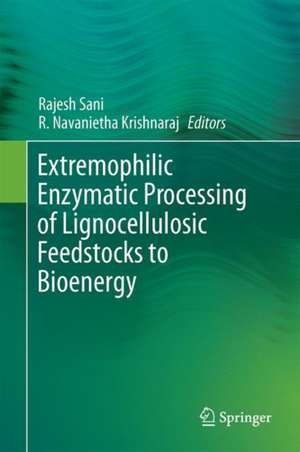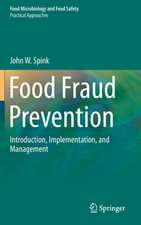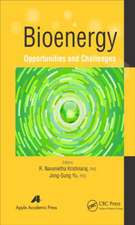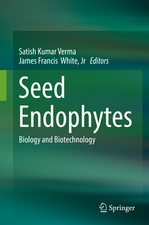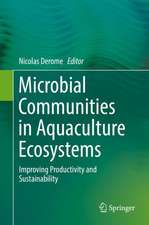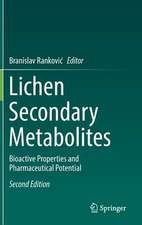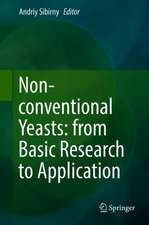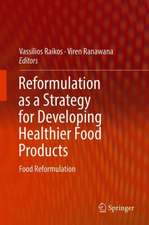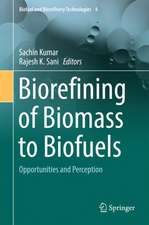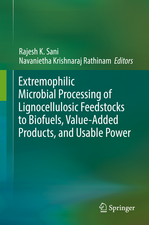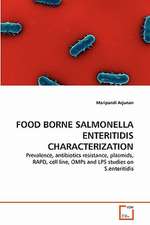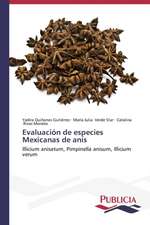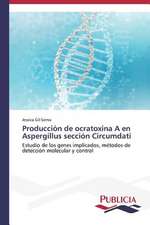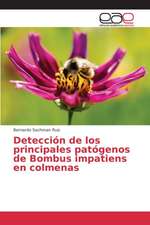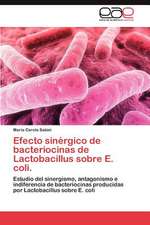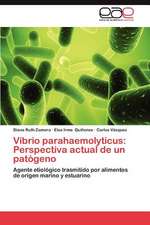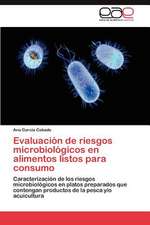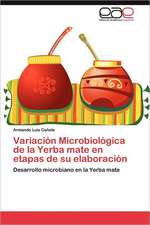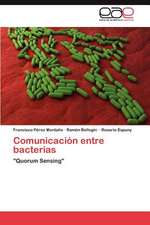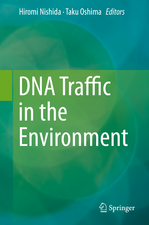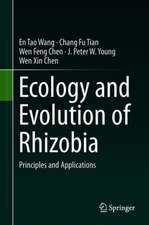Extremophilic Enzymatic Processing of Lignocellulosic Feedstocks to Bioenergy
Editat de Rajesh K. Sani, R. Navanietha Krishnarajen Limba Engleză Hardback – 7 iul 2017
This book introduces fundamentals of enzymatic processes, various renewable energy resources and their pretreatment processes. It presents in-depth review of extremophilic enzymes (e.g., Cellulases, Xylanases, Lytic Polysaccharide Monooxygenases, Amylases, Ligninases, Pectinases, Esterases, and Chitinases) which can be used in several biotechnological processes. In addition, the authors present expert knowledge on how to engineer enzymes for enhanced conversion of lignocellulosic feedstocks to biofuels.
Extremozymes play important roles in many kinds of bioprocessing e.g., in conversion of non-food biomass into usable power. Existing enzymatic technologies, including hydrolysis of lignocellulose into sugars, have several limitations such as they have very slow enzymatic hydrolysis rates, yields low products, requires high dosages of enzymes, and are sensitive to microbial contamination problems. These limitations could be overcome using extremophilic enzymes.
| Toate formatele și edițiile | Preț | Express |
|---|---|---|
| Paperback (1) | 362.20 lei 38-44 zile | |
| Springer International Publishing – 13 mai 2018 | 362.20 lei 38-44 zile | |
| Hardback (1) | 399.29 lei 3-5 săpt. | |
| Springer International Publishing – 7 iul 2017 | 399.29 lei 3-5 săpt. |
Preț: 399.29 lei
Nou
Puncte Express: 599
Preț estimativ în valută:
76.40€ • 79.78$ • 63.09£
76.40€ • 79.78$ • 63.09£
Carte disponibilă
Livrare economică 25 martie-08 aprilie
Preluare comenzi: 021 569.72.76
Specificații
ISBN-13: 9783319546834
ISBN-10: 331954683X
Pagini: 394
Ilustrații: XVI, 308 p. 46 illus., 26 illus. in color.
Dimensiuni: 155 x 235 x 22 mm
Greutate: 0.68 kg
Ediția:1st ed. 2017
Editura: Springer International Publishing
Colecția Springer
Locul publicării:Cham, Switzerland
ISBN-10: 331954683X
Pagini: 394
Ilustrații: XVI, 308 p. 46 illus., 26 illus. in color.
Dimensiuni: 155 x 235 x 22 mm
Greutate: 0.68 kg
Ediția:1st ed. 2017
Editura: Springer International Publishing
Colecția Springer
Locul publicării:Cham, Switzerland
Cuprins
Introduction.- Fundamentals of enzymatic processes.- Pretreatment of lignocellulosic feedstocks.- Approaches for bioprospecting cellulases.- Extremophilic xylanases.- Lytic polysaccharide monooxygensases.- Recent advances in extremophilic α-amylases.- Extremophilic ligninolytic enzymes.- Extremophilic pectinases.- An overview on extremophilic esterases.- Extremophilic esterases for bioprocessing of lignocellulosic feedstocks.- An overview on extremophilic chitinases.- Extremophilic lipases.- Bioprospection of extremozymes for conversion of lignocellulosic feedstocks to bio-ethanol and other biochemicals.
Notă biografică
Rajesh K. Sani is an Associate Professor in the Department of Chemical and Biological Engineering and Chemistry and Applied Biological Sciences at the South Dakota School of Mines and Technology, South Dakota. He joined the South Dakota School of Mines and Technology as an Assistant Professor in 2006. Prior to this, he worked as a Post-doctoral Researcher and Research Assistant Professor at the Washington State University, Pullman, WA, and focused his research on Waste Bioprocessing. He also served as an Associate Director of NSF Center for Multiphase Environmental Research at the Washington State University. He received his BS in Mathematics from the Meerut University in India, his MS in Enzyme Biotechnology from Devi Ahilya University in India, and his PhD in Environmental Biotechnology from the Institute of Microbial Technology in India.
Due to his interdisciplinary background, Sani has been integrating engineering with biological sciences in his teaching as well research endeavors. For over twelve years, Sani has engaged in a constant endeavor to improve his teaching skills to become an effective instructor and communicator. In Washington State University’s School of Chemical and Bioengineering and Center for Multiphase Environmental Research, he taught a variety of engineering courses including Integrated Environmental Engineering for Chemical Engineers, Bioprocess Engineering, and Current Topics in Multiphase Environmental Research - a team taught interdisciplinary course to undergraduate and graduate students. Over the last nine years at the South Dakota School of Mines and Technology, he has been teaching various science and engineering curses including Microbiology for Engineers, Biochemistry Laboratories, Bioinformatics, Molecular Biology for Engineers, Microbial Genetics, and Microbial and Enzymatic Processing to students of various disciplines of Chemical Engineering, Environmental Engineering, Applied Biological Sciences, Chemistry, Interdisciplinary Studies, Biology, Medical, and Paleontology. Sani has received several awards including the outstanding student research (India), Department of Biotechnology Scholarship (India), the Council of Scientific and Industrial Research (India), and Science and Technology Agency (Japan).
Sani group’s research includes extremophilic bioprocessing of lignocellulose-based renewables for biofuels and bioproducts and bioprospecting of extremophilic microorganisms for developing more efficient and cost-effective biofuel (bioenergy) production technologies. Over the past 11 years, he has been the PI or co-PI on over $12 million in funded research. Several of his accomplishments in research and advising include: i) Postdocs supervised (7); ii) Graduate students supervised (MS students, 10 and PhD, 6), and iii) Undergraduate students and K12 teachers supervised (over 35). He has one patent, five invention disclosures, and published over 55 peer-reviewed articles in high impact factor journals, and has contributed in several book chapters. He is currently acting as editor and co-editor for three text books which will be published by Springer International Publishing AG. In addition, he has been a proposal reviewer and panelist for the Federal Agencies i) National Science Foundation, ii) U.S. Army Research Office, iii) Department of Energy, iv) U.S. Geological Survey, and v) User Facility - Environmental Molecular Sciences Laboratory. He also serve the Industrial Microbiology profession as “Biocatalysis Program Committee Member” of the Society for Industrial Microbiology and Biotechnology (SIMB), technical session chair at the Annual American Institute of Chemical Engineers (AIChE) and SIMB, an associate editor.
R.Navanietha Krishnaraj is currently a B-ACER fellow and Research Professor at the Department of Chemical and Biological Engineering, South Dakota School of Mines and Technology, USA. Prior to this, he worked at the Department of Biotechnology, National Institute of Technology Durgapur, India. He received his B.Tech in Biotechnology and PhD in Chemical Engineering in the field of microbial fuel cells from the CSIR—Central Electrochemical Research Institute, Karaikudi, India. He recently received the prestigious Bioenergy Award for Cutting Edge Research (B-ACER) from the Department of Biotechnology, Government of India, and the Indo-U.S. Science and Technology Forum. His areas of research interest include bioelectrocatalysis and bioenergy. He has taught bioinformatics and computational biology courses to undergraduate students. He is a life member of several renowned professional societies. He is the faculty advisor for the Indian Society for Technical Education, Durgapur Chapter.
Due to his interdisciplinary background, Sani has been integrating engineering with biological sciences in his teaching as well research endeavors. For over twelve years, Sani has engaged in a constant endeavor to improve his teaching skills to become an effective instructor and communicator. In Washington State University’s School of Chemical and Bioengineering and Center for Multiphase Environmental Research, he taught a variety of engineering courses including Integrated Environmental Engineering for Chemical Engineers, Bioprocess Engineering, and Current Topics in Multiphase Environmental Research - a team taught interdisciplinary course to undergraduate and graduate students. Over the last nine years at the South Dakota School of Mines and Technology, he has been teaching various science and engineering curses including Microbiology for Engineers, Biochemistry Laboratories, Bioinformatics, Molecular Biology for Engineers, Microbial Genetics, and Microbial and Enzymatic Processing to students of various disciplines of Chemical Engineering, Environmental Engineering, Applied Biological Sciences, Chemistry, Interdisciplinary Studies, Biology, Medical, and Paleontology. Sani has received several awards including the outstanding student research (India), Department of Biotechnology Scholarship (India), the Council of Scientific and Industrial Research (India), and Science and Technology Agency (Japan).
Sani group’s research includes extremophilic bioprocessing of lignocellulose-based renewables for biofuels and bioproducts and bioprospecting of extremophilic microorganisms for developing more efficient and cost-effective biofuel (bioenergy) production technologies. Over the past 11 years, he has been the PI or co-PI on over $12 million in funded research. Several of his accomplishments in research and advising include: i) Postdocs supervised (7); ii) Graduate students supervised (MS students, 10 and PhD, 6), and iii) Undergraduate students and K12 teachers supervised (over 35). He has one patent, five invention disclosures, and published over 55 peer-reviewed articles in high impact factor journals, and has contributed in several book chapters. He is currently acting as editor and co-editor for three text books which will be published by Springer International Publishing AG. In addition, he has been a proposal reviewer and panelist for the Federal Agencies i) National Science Foundation, ii) U.S. Army Research Office, iii) Department of Energy, iv) U.S. Geological Survey, and v) User Facility - Environmental Molecular Sciences Laboratory. He also serve the Industrial Microbiology profession as “Biocatalysis Program Committee Member” of the Society for Industrial Microbiology and Biotechnology (SIMB), technical session chair at the Annual American Institute of Chemical Engineers (AIChE) and SIMB, an associate editor.
R.Navanietha Krishnaraj is currently a B-ACER fellow and Research Professor at the Department of Chemical and Biological Engineering, South Dakota School of Mines and Technology, USA. Prior to this, he worked at the Department of Biotechnology, National Institute of Technology Durgapur, India. He received his B.Tech in Biotechnology and PhD in Chemical Engineering in the field of microbial fuel cells from the CSIR—Central Electrochemical Research Institute, Karaikudi, India. He recently received the prestigious Bioenergy Award for Cutting Edge Research (B-ACER) from the Department of Biotechnology, Government of India, and the Indo-U.S. Science and Technology Forum. His areas of research interest include bioelectrocatalysis and bioenergy. He has taught bioinformatics and computational biology courses to undergraduate students. He is a life member of several renowned professional societies. He is the faculty advisor for the Indian Society for Technical Education, Durgapur Chapter.
Textul de pe ultima copertă
This book introduces fundamentals of enzymatic processes, various renewable energy resources and their pretreatment processes. It presents in-depth review of extremophilic enzymes (e.g., Cellulases, Xylanases, Lytic Polysaccharide Monooxygenases, Amylases, Ligninases, Pectinases, Esterases, and Chitinases) which can be used in several biotechnological processes. In addition, the authors present expert knowledge on how to engineer enzymes for enhanced conversion of lignocellulosic feedstocks to biofuels.
Extremozymes play important roles in many kinds of bioprocessing e.g., in conversion of non-food biomass into usable power. Existing enzymatic technologies, including hydrolysis of lignocellulose into sugars, have several limitations such as they have very slow enzymatic hydrolysis rates, yields low products, requires high dosages of enzymes, and are sensitive to microbial contamination problems. These limitations could be overcome using extremophilic enzymes.
Caracteristici
Demonstrates the limitations in existing enzymatic hydrolysis technologies Provides a discussion to overcome those limitations using enzymes having unique properties Provides the knowledge on how to engineer enzymes for enhanced conversion of lignocellulosic feedstocks to bioenergy Provides applications of extremophilic enzymes in various biotechnological processes
